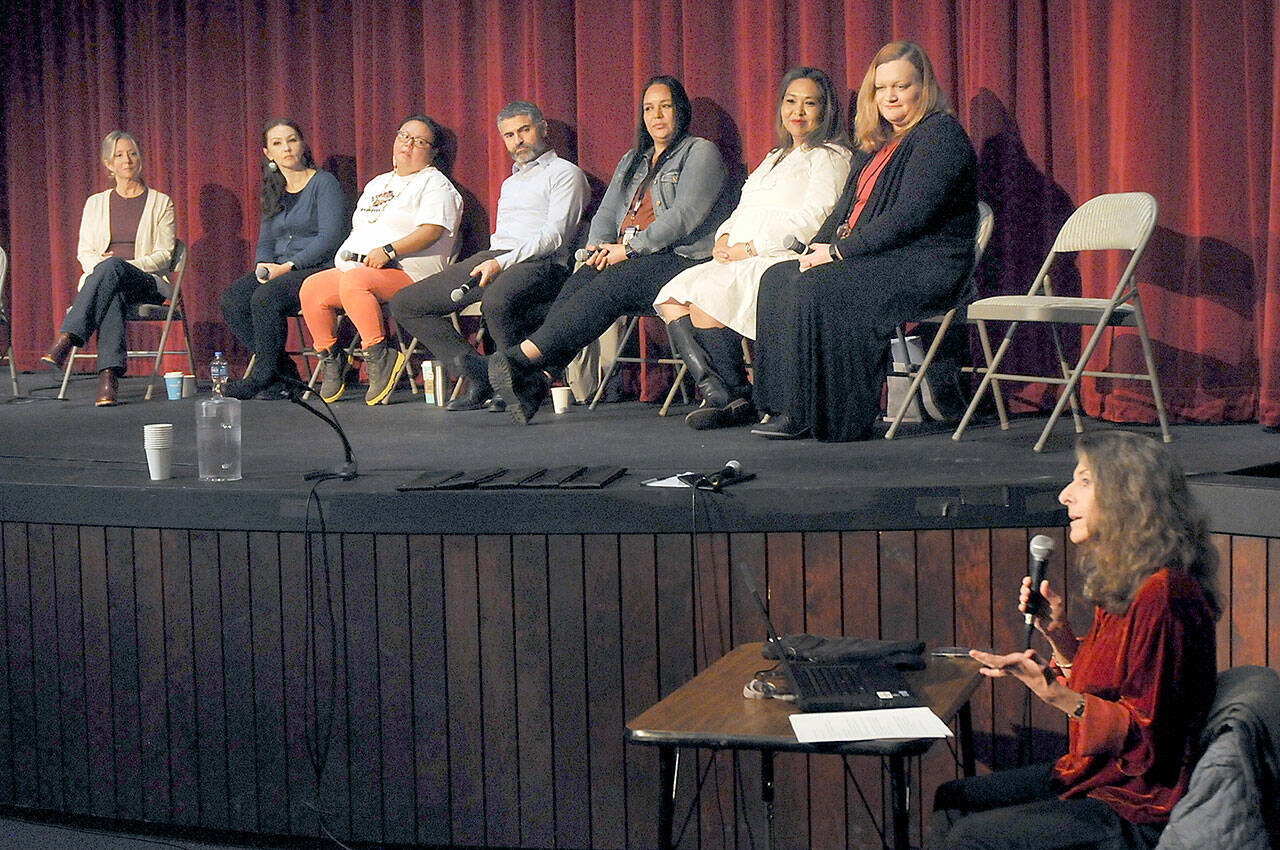PORT ANGELES — The Peninsula College’s Studium Generale hosted principals involved in the recently established Indian Child Welfare Act Court that serves Native American families in Clallam County.
The panel discussion at Peninsula College’s Port Angeles campus followed the streaming of the 2018 documentary, “Dawnland,” that followed native and non-native participants in a Truth and Reconciliation Commission in Maine.
Brandon Mack, the family court commissioner for Clallam County who led the establishment of the Indian Child Welfare Act (ICWA) court in August, was joined by family court facilitator Rachel Munoz-McCormick and by court staff from six area tribes. Present were Jessica Humphries and Dustin Brenske (Jamestown S’Klallam); Joylina Gonzalez (Port Gamble S’Klallam); Vashti White (Lower Elwha Klallam); Tahnee Hudson (Hoh, on Zoom); Charlotte Penn and Miss Ann Penn Charles (on Zoom) (Quileute).
Clallam County’s ICWA court is one of two such courts in the state with the other in Spokane; there are only 17 in the entire nation.
Conversation focused on the work of the individuals and the ICWA court to support children and panel members’ reflections on Dawnland, which documented testimonies from the nation’s only Truth and Reconciliation Commission and attested to the destructive and painful impact of social welfare practices before passage of the ICWA in 1978.
“The passage of the Indian Child Welfare Act is one of the most, if not the most, significant pieces of legislation that our federal government has ever passed,” Mack said.
The ICWA established minimum standards for the removal of native children from their families and preferences for placing those who are removed from their homes with extended family or tribal members.
The act is intended to protect native children’s separation from their tribal communities by adoption or into foster care by non-native families.
Washington state has its own version, the Washington State Indian Child Welfare Act, which passed in 2011 and is more expansive than the federal legislation.
Nonetheless, Native American children in Washington state are over-represented in the foster care system by a factor of three and the percentage of Native American children in Washington state is also higher than the national average according to the most recent data from the National Council for Juvenile Justice.
Gonzalez, child welfare program manager with the Port Gamble S’Klallam Tribe, said working with the ICWA court in Clallam County is in the best interest of the children and families because tribes have the kind of knowledge and understanding of their communities that the court system doesn’t.
“The tribe has a voice in the very beginning and I think that’s something that we very much appreciate,” Gonzalez said. “Also, we are able to share what resources that we have that a lot of times the state doesn’t know or Child Protective Services doesn’t know about.”
Involving the tribes in the creation of the ICWA court has helped change how native families interact with the court system said White, the Lower Elwha Klallam Tribe child welfare program manager.
“Everybody has said it’s really nice to go in and know that what you’re saying has value,” White said. “We can give feedback and ideas and suggestions to help the social worker and the family or the commissioner understand what the issues might be.
“We get an idea of what child abuse and neglect look like, but what’s the root of the problem? Until we get to hash that out and talk about that we can’t come up with creative solutions to better help families.”
The Studium Generale event came one week before the Supreme Court of the United States this coming Thursday will hear Haaland v. Brackeen, which challenges the constitutionality of parts of the ICWA.
The event was hosted by Studium Generale, Peninsula College’s Magic of Cinema, and ʔaʔk̓ʷustəƞáwt̓xʷ House of Learning as part of the college’s celebration of Native American Heritage Month.
________
Reporter Paula Hunt can be reached at Paula.Hunt@soundpublishing.com

